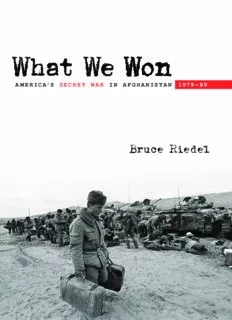Table Of Content(cid:36)(cid:48)(cid:40)(cid:53)(cid:44)(cid:38)(cid:36)(cid:182)(cid:54)(cid:3)(cid:54)(cid:40)(cid:38)(cid:53)(cid:40)(cid:55)(cid:3)(cid:58)(cid:36)(cid:53)(cid:3)(cid:44)(cid:49)(cid:3)(cid:36)(cid:41)(cid:42)(cid:43)(cid:36)(cid:49)(cid:44)(cid:54)(cid:55)(cid:36)(cid:49)(cid:3) (cid:20)(cid:28)(cid:26)(cid:28)(cid:177)(cid:27)(cid:28)
Bruce Riedel
I
n February 1989, the CIA’s chief
in Islamabad famously cabled
headquarters a simple message, “We
Won.” It was an understated coda to
the most successful covert intelligence
operation in American history.
In What We Won, CIA and National Security
Council veteran Bruce Riedel tells the story
of America’s secret war in Afghanistan and
the defeat of the Soviet 40th Red Army in
a struggle that proved to be the final and
decisive battle of the cold war. By answering
the question—why did this intelligence
operation succeed so brilliantly?— Riedel
presents a nuanced narrative about the
conflict to show how, counterintuitively,
America won this intelligence battle.
Riedel has the vantage point few others
can offer: he was ensconced in the CIA’s
Operations Center when the Soviet Union
invaded Afghanistan on Christmas Eve
1979. The invasion took the intelligence
community by surprise. But the response,
initiated by Jimmy Carter and accelerated by
Ronald Reagan, was a masterful intelligence
enterprise.
Many books have been written about
intelligence failures—from Pearl Harbor to
9/11. Much less has been written about how
and why intelligence operations succeed.
The answer is complex. It involves both
the weaknesses and mistakes of America’s
enemies, as well as the good judgment and
strengths of the United States
Riedel introduces and explores the various
personalities pitted against each other—
the Afghan communists, the Russians,
the Afghan mujahedin, the Saudis, and
the Pakistanis. And then there are the
(continued on back flap)
Americans—in this war, no Americans fought
on the battlefield. The CIA did not send
officers into Afghanistan to fight or even
to train.
In 1989, victory for the American side of
the cold war seemed complete. Looking back,
now we can see that a new era was initiated
in Afghanistan in the 1980s—the era of the
global jihad. This book examines the lessons
we can learn from the Afghan intelligence
operation, while it also considers what came
next in Afghanistan—and what is likely yet
to come.
BRUCE RIEDEL is senior
fellow and director of the
Brookings Intelligence
Project. Riedel joined
Brookings following a
thirty-year career at the
Central Intelligence Agency.
He served as a senior
adviser to four U.S. presidents on South Asia
and the Middle East, working as a senior
member of the National Security Council. In
2009 President Obama made him chairman
of a strategic review of American policy in
Afghanistan and Pakistan. He is author of the
Brookings best seller The Search for al Qaeda:
Its Leadership, Ideology, and Future.
COVER PHOTOGRAPH: © REUTERS/SERGEI KARPUKHIN
COVER: SESE-PAUL DESIGN
00-2595-4 fm.indd 1 4/30/14 2:14 PM
00-2595-4 fm.indd 2 4/30/14 2:14 PM
AmericA’s secret WAr
in AfghAnistAn, 1979–89
bruce riedel
brookings institution press
Washington, D.C.
00-2595-4 fm.indd 3 4/30/14 2:14 PM
Copyright © 2014
the brookings institution
1775 Massachusetts Avenue, N.W., Washington, D.C. 20036
www.brookings.edu
All rights reserved. No part of this publication may be reproduced or transmitted
in any form or by any means without permission in writing from the Brookings
Institution Press.
The Brookings Institution is a private nonprofit organization devoted to research,
education, and publication on important issues of domestic and foreign policy.
Its principal purpose is to bring the highest quality independent research and
analysis to bear on current and emerging policy problems. Interpretations or
conclusions in Brookings publications should be understood to be solely those
of the authors.
Library of Congress Cataloging-in-Publication data
Riedel, Bruce O.
What we won : America’s secret war in Afghanistan, 1979–89 / Bruce Riedel.
pages cm
Includes bibliographical references and index.
ISBN 978-0-8157-2584-8 (hardcover : acid-free paper)—ISBN 978-0-8157-
2595-4 (paperback : acid-free paper) 1. United States—Foreign relations—
Afghanistan. 2. Afghanistan—Foreign relations—United States. 3. Espionage,
American—Afghanistan—History—20th century. 4. United States. Central
Intelligence Agency—History—20th century. 5. National security—United
States—History—20th century. 6. United States—Military policy. 7. Afghani-
stan—History—Soviet occupation, 1979–1989. 8. United States—Foreign rela-
tions—Soviet Union. 9. Soviet Union—Foreign relations—United States.
I. Title.
E183.8.A3R54 2014
327.730581—dc23 2014011190
9 8 7 6 5 4 3 2 1
Printed on acid-free paper
Typeset in Sabon
Composition by Cynthia Stock
Silver Spring, Maryland
00-2595-4 fm.indd 4 4/30/14 2:14 PM
In loving memory of
Milton and Ruth Signe Riedel
00-2595-4 fm.indd 5 4/30/14 2:14 PM
00-2595-4 fm.indd 6 4/30/14 2:14 PM
contents
Introduction and Acknowledgments ix
PArt 1: the PlAyers
1 The Afghan Communists 3
2 The Main Enemy: The Soviets 20
3 The Afghan Mujahedin 40
4 The Pakistanis: Zia’s War 56
5 The Saudis: Financiers and Volunteers 74
PArt 2: the u.s. WAr
6 Jimmy Carter’s War 93
7 Reagan and Casey 110
8 Endgames without End 128
9 Lessons of the Secret War 141
Notes 157
Index 177
vii
00-2595-4 fm.indd 7 4/30/14 2:14 PM
Description:In February 1989, the CIA's chief in Islamabad famously cabled headquarters a simple message: "We Won." It was an understated coda to the most successful covert intelligence operation in American history.In What We Won, CIA and National Security Council veteran Bruce Riedel tells the story of Americ

